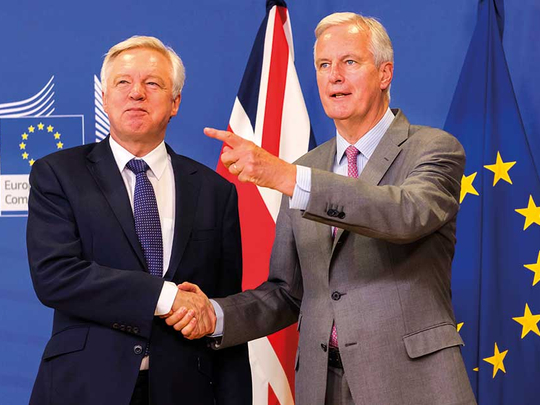
London: Britain and the European Union (EU) are at odds over how soon the Brexit talks can pivot towards a trade deal just a week before negotiations are set to resume.
Adopting a provocative posture, UK Prime Minister Theresa May’s government declared at the weekend that it’s “stepping up pressure” on the bloc to shift the discussions away from the terms of separation as soon as October.
The use of fighting words in the past has not budged the EU and in a sign the UK will be disappointed, Slovenian Prime Minister Miro Cerar told the Guardian, “The process will definitely take more time than we expected.”
Signs of fresh discord may unnerve investors after the pound last week under-performed all of its Group of 10 counterparts. By giving out more details of where it stands and spelling out its demands, the UK wants to change the narrative that it’s been too vague, and by doing so jolt the EU into talking trade sooner.
With the clock ticking down to the UK’s March 2019 departure, and the two sides clashing over many key issues, Brexit Secretary David Davis seems bent on reviving a debate over whether talks should run in parallel rather than in the strict order the EU has laid out.
Such an ambition will draw short shrift from the EU. Its chief negotiator, Michel Barnier, last week reiterated that the other 27 governments won’t allow trade talks to start until “sufficient progress” has been made resolving residency rights, the UK’s exit bill and the border with Ireland.
Sluggish Progress
The original hope was to reach this milestone in October — in time for a summit of EU leaders — but that is now in doubt amid criticism within the EU of sluggish progress and a lack of detail from the British.
“There are so many difficult topics on the table, difficult issues there, that one cannot expect all those issues will be solved according to the schedule made in the first place,” Slovenia’s Cerar told the Guardian. “What is important now is that the three basic issues are solved in reasonable time.”
Having once predicted differences over the timetable would prove the “row of the summer”, Davis backtracked in June by appearing to sign on to the EU’s preferred plan. But writing in the Sunday Times, he insisted it would be helpful “to run aspects of the negotiations twice”, pointing to Northern Ireland as an issue where the divorce and commerce are intertwined.
“It is simply not possible to reach a near-final agreement on the border issue until we’ve begun to talk about how our broader future customs arrangements will work,” he wrote. “Furthermore, if we get the comprehensive free trade agreement we’re seeking as part of our future partnership, solutions in Northern Ireland are easier to deliver.”
This more combative approach was criticised by anti-Brexit campaigners as casting doubt on the government’s ability to conduct negotiations.
‘Reeks of Desperation’
“To be now, a couple of months down the line, trying to reopen the issue reeks of desperation at an approaching economic storm and a cabinet who don’t have a clue,” said Liberal Democrat lawmaker Tom Brake, who speaks for the party on Brexit.
The UK last week outlined its position on future customs arrangements, only for Barnier to tweet that the quicker an agreement was found on the break-up topics “the quicker we can discuss customs and future relationship”.
Five new position papers the UK government will publish this week will include an outline of “goods on the market” and “confidentiality of documents”. The first is a response to an EU paper setting out provisions that goods made available for sale before Brexit should still be available for purchase in both the EU and UK after Britain’s withdrawal.
Davis will say the EU proposals should extend to related services; for example, a maintenance contract that comes with the sale of an elevator.
A New Court?
Later in the week, documents dealing with data protection, judicial cooperation and resolving post-Brexit disputes will come out. The latter will prove the most contentious given May has made escaping oversight of European courts a red line while the EU sees a continued role for the European Court of Justice.
One of these papers will suggest establishing a new court to oversee post-Brexit relations between the UK and the EU, looking at precedents such as European Free Trade Association court, the Financial Times reported. Davis will set out options on the judicial regime sought by the UK including trade, security and citizens’ rights.
May’s refusal to allow the jurisdiction of the European Court of Justice is “foolish” and incompatible with UK proposals for a post-Brexit transition period, Paul Jenkins, a former chief of the government’s legal services told the Observer newspaper.
Meantime, economists exchanged blows on Sunday over whether Brexit will help or harm the British economy.
A group of pro-Brexit economists, including Patrick Minford of Cardiff University, estimated that leaving the EU single market and customs union could add 135 billion pounds (Dh639 billion) to the UK economy, and lower prices by opening up global free trade and spurring competition.
In response, Monique Ebell of the National Institute of Economic and Social Research said the UK stood to lose as much as 30 per cent of its total trade by leaving the EU’s single market, and that a decline in sterling would boost inflation.












